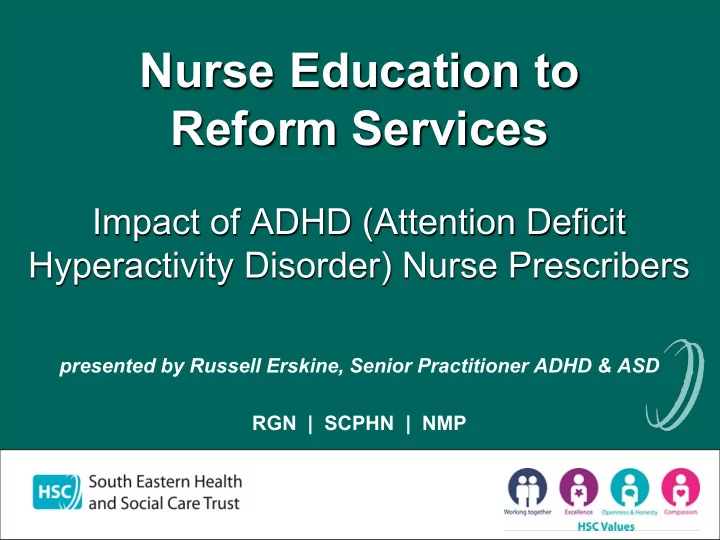

Nurse Education to Reform Services Impact of ADHD (Attention Deficit Hyperactivity Disorder) Nurse Prescribers presented by Russell Erskine, Senior Practitioner ADHD & ASD RGN | SCPHN | NMP
• ADHD is the most prevalent childhood condition, with a global incidence of 3-5% of school age children (Pickett, 2016) • NICE Clinical guideline 87 outlines assessment, diagnosis and management of ADHD
image from ADHDandyou.co.uk
Why treat ADHD? Children with untreated ADHD (Barkley, 1998); • 20% more likely to not complete secondary school • 30% more likely to have a teenage pregnancy • 25% more likely to engage in substance abuse • 30% more likely to be arrested • 20% more likely to go to prison
South Eastern Trust Service Outline: • 2,800 patients aged 6-18 years old • Referrals to service have increased 44% over the last three years
• Children receiving medication management of symptoms require 6 monthly health reviews (NICE Guideline 87) • Efficacy of treatment • Side effect exposure • Health review including height, weight and blood pressure • Psychoeducation
The SET Nursing Team Consists of; 1.0 WTE, Service Lead, Trust wide, Band 8A. Carol Sibbald 3 x 0.5 WTE, Senior Practitioners, Band 7. Russell Erskine , Scrabo, Newtownards ADHD SETrust
Julie Jackson, Warren, Lisburn 3 x 1.5 WTE, Senior Practitioners, Band 7. Veronica Bailie, Downe, Downpatrick ADHD SETrust
• Nurses working in this way are under the Neurodevelopmental Team – A newly developed service for the complex assessment, formulation and intervention for children with complex needs. – Specialising in ASD and ADHD, differential diagnosis and dual diagnoses – ADHD clinical assessment and reviews are 1/3 of their job plans under this service
Non-Medical Prescribing • Legislative changes in 2012 to the misuse of drugs regulations allowed schedule 2 controlled drugs to be prescribed by non- medical prescribers • Shared care arrangements with GPs to fulfil prescriptions on the advice of hospital based specialists
Non-Medical Prescribing Course • Practitioners complete course content with assignments specific to their area of practice • Completion of prescribing in practice module • Completion of health assessment module • Completion of pharmacology module = Safe and Effective Care
Impact of Nurses in the Service 2019; total number of medication reviews 3,788 Reviews completed by a nurse 2,186 = 58%
Service User Feedback • Appreciated timely reviews • Happy with the level of care received • Felt the nurse adopted a whole family approach • Incredibly patient, helpful, attentive and professional • One parent commented; “It’s doing the simple things well and promptly that make the difference when you have a child with ADHD”
Aspirations for Future • ADHD youth forum • Further development of parent training and psychoeducation • QI project • SQE project • Advanced nurse practitioner role
Recommend
More recommend